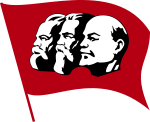Real socialism
Real socialism (also actually existing socialism)[1] was an ideological catchphrase popularized during the Brezhnev era within the Eastern Bloc countries and the Soviet Union.[2] The term referred to the Soviet-type economic planning enforced by the ruling communist parties at that particular time.[2]
From the 1960s onward, countries such as Poland, East Germany, Hungary and Czechoslovakia, began to argue that their policies represented what was realistically feasible given their level of productivity, even if it did not conform to the Marxist concept of socialism. The concept of real socialism alluded to a future highly developed socialist system. However, the lagging productivity growth and insufficient standard of living in the Comecon countries caused the phrase "real socialism" to be increasingly perceived as dishonest and unreal. The actual party claims of nomenclatory socialism began to acquire not only negative but also sarcastic meanings. In later years, and especially after the dissolution of the Soviet Union, the term began to be remembered as only one thing, as a reference for Soviet-style socialism.[note 1]
Definition
After World War II, the terms "real socialism" or "really existing socialism" gradually became the predominating euphemisms used as self-description of the Eastern Bloc states' political and economical systems and their society models.[3] De jure often referred to as "(democratic) people's republics," these states were ruled by a single Soviet-aligned Marxist-Leninist party, some of which were ruled autocratically, and had adapted a form of planned economy and propagated socialism and/or Communism as their ideology.[3] The term "real (-ly existing) socialism" was introduced to explain the obvious gap between the propagated ideological framework and the political and economical reality faced by these states' societies.[3]
The role of the Sino-Soviet split
Another aspect of the term real socialism contained elements of the Sino-Soviet split and other "disagreements," which were actually ideological gulfs, between the USSR and its satellite states on one side, and the People's Republic of China and the followers of a more Maoist brand of communist ideology on the other. The Soviets wished to enforce the idea that their version of socialism was "real" and the Chinese and their followers were not, precisely because the Maoist-inspired communist movement, which had grown so rapidly worldwide as a "radical left" alternative to Soviet ideas, had consistently claimed that the Soviet Union was no longer socialist and had betrayed the Revolution. To counter this claim of Marxist revisionism, the Soviets defiantly claimed that their socialism was "real socialism," implying that other models of socialism were unrealistic.[4]
Soviet popular culture
The term was also used in an ironical criticism. The "reality" of "real socialism" was used against it. In particular, the term became a target of numerous political jokes within the Soviet Union, the following being typical examples.[4]
- "Do you know the boundary between real socialism and communism?" -- "The border passes along the Kremlin's wall" [hinting that only rulers of the Soviet Union live in the bright communist future promised by Karl Marx]
- "What is real socialism?" -- "This is when you can not get everything without money yet, but you can not buy anything for your money already". [hinting at the long lines and frequent shortages of consumer goods in the Soviet stores]
- Armenian Radio was asked: "Is it possible to build real socialism in Armenia?" Armenian Radio answers: "Yes, but better in Georgia".
In the West
The term "actually existing socialism" was often used by orthodox Communists in the West to attack either their external (typically Trotskyist) opponents or their internal (typically Eurocommunist) critics. The achievement of "actual" socialism being used as a counter to these groups' critiques of repression inside the "Socialist Countries".
See also
- Actually existing capitalism
- Communist state
- Marxism-Leninism
- Primary stage of socialism
- Soviet-type economic system
- State capitalism
- State socialism
- Transition economy
Footnotes
- ↑ See, definitions and descriptions of "real socialism" in the following:
- Kyu-Young Lee, "System Transformation in Poland since 1989: A view on the transformation of the real-socialist system." Including List of References. Graduate School of International Studies, Sogang University.
- Krzysztof Brzechczyn, The Collapse of Real Socialism in Eastern Europe. Adam Mickiewicz University, Department of Philosophy. The Journal of Interdisciplinary Studies in History and Archaeology. Vol. 1, No. 2, pp. 105–133
- Jacek Tittenbrun, The Collapse of 'Real Socialism` in Poland. Paul & Co Pub Consortium ISBN 1-85756-043-4
- Robert W. Cox, "Real socialism" in historical perspective. Pages 177–183. Google Docs. Retrieved November 3, 2011. See term: "actually existing socialism" in Rudolph Bahro's The Alternative in Eastern Europe, Note 3, p. 190.
References
- ↑ Victor Sebestyen. Revolution 1989: The Fall of the Soviet Empire. ISBN 978-0-7538-2709-3.
- 1 2 Socjalizm Realny (Real Socialism) Encyklopedia Interia. (Polish) Retrieved November 22, 2013.
- 1 2 3 Hey, Patrizia (2010). Die sowjetische Polenpolitik Anfang der 1980er Jahre und die Verhängung des Kriegsrechts in der Volksrepublik Polen. Tatsächliche sowjetische Bedrohung oder erfolgreicher Bluff?. Studien zu Konflikt und Kooperation im Osten. 19. Münster: LIT. p. 31.
- 1 2 Benedikt Sarnov, Our Soviet Newspeak: A Short Encyclopedia of Real Socialism (Наш советский новояз. Маленькая энциклопедия реального социализма). "Real Socialism", pages 472-474. Moscow: 2002, ISBN 5-85646-059-6.
- General
- Real socialism from A Dictionary of Sociology, 1998, originally published by Oxford University Press.
